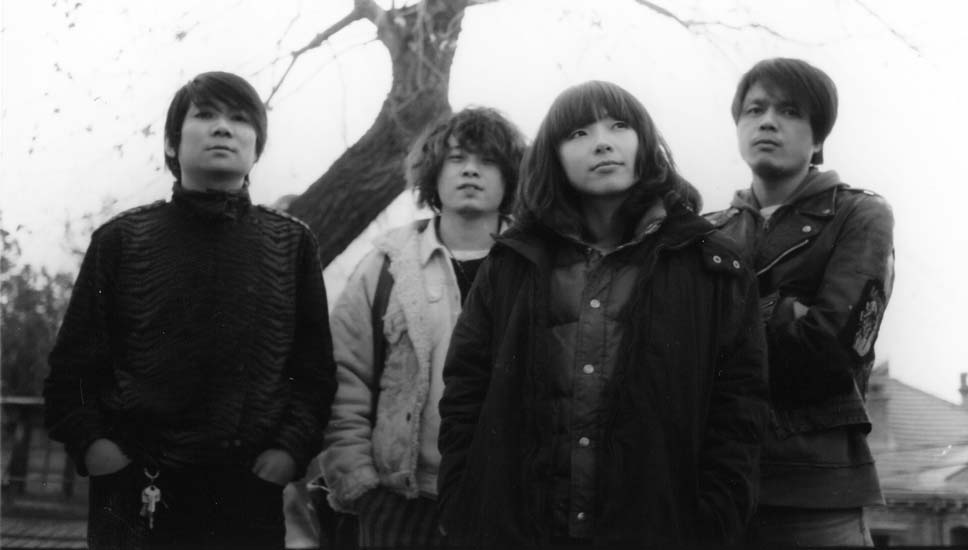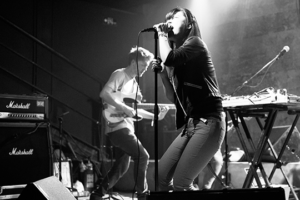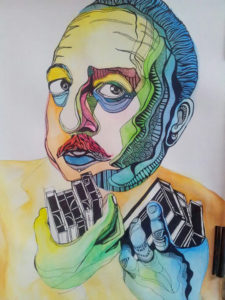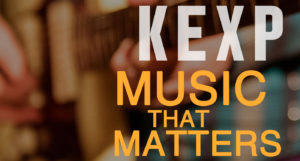
Originally published on Genjing Records
AV Okubo formed in 2006 in Wuhan. What made you decide to start a band in Wuhan at that time and what was it that first brought your members together?
The band formed as a result of youthful abandon, pure and simple. Initially, we were pretty shit, but we worked crazy hard and got better and better, I guess. After graduation, I did many other things musically, but they all ended up pretty crap. I blame it all on teenage bullshit. A little while later, I decided to make the band AV Okudo and that obviously worked out. All of us met each other through Zuo Yi, our bassist. Zuo Yi is a magical being. He is the king of conquering obstacles both large and small. When he was not doing the band thing, he was surrounded by a bunch of kids and girls love him. He’s like a hero from an Emir Kusturica film or something.
What’s the meaning behind your name?
It’s a name I came up with after I watched this Ge Ming Hui’s movie “Two People’s World After Loving Starts”. The name came from one of the “chapters” in the film. The movie is about a Japanese gangster who went all the way to Hongkong to find a girl he loved in the past. When he, the man who had been looking for love, was running in the night of Jiu Long ( A downtown area of Hongkong), AV Okubo was on the screen. [Ed. If you haven’t seen that flick, do it!]
You draw a lot of references from 80s Hong Kong movies and film in general, you actually studied film in Canada, how does cinema influence your sound and the aesthetic for the band?
Not only in the 80s, but also the 90s, and even the ones after 2000. There are a lot of Hong Kong movies I like very much. Movies are very important to us who grew up in the mainland, maybe more important than records. We saw movies, scenes and the stories, then we started to imagine the outside world… Music, is too troublesome, looking for and translating lyrics are all very difficult. But the music in the movies are easy to understand, with subtitles, actions, together with everything are naturally and easily received by the audience.

What other influences do you draw from and how would you describe your sound?
As a person who grew up in the 80s here, I realized more and more that the honest and pure language is the most precious heritage we’ve gotten from it. Persistence and toughness is the unique persona of the mainland’s rock and roll. But I like to add some gangster flavor and some self-destructive western Rock into it. These conflicting personalities made our work anxious, like the ants on a hot pan.
Your first album was recording with Martin Atkins, from PiL & Pigface fame, what was it like working together with Martin? He’s very influenced by dub and likes to inject that into a lot of the bands he produces, how much influence did he have over the sound of those recordings, did your songs change much in the recording process?
Actually the cooperation with Martin was quite a rush, it only took us 3 days to finish recording the first album. That was the first time we went to the recording studio to record songs. We all pretended to be super experienced and everything, then we completed this album very efficiently. It didn’t give him time and space for him to “overproduce” it. Nevertheless, he remixed one of our songs “I want blue smurf” to a dub version. Out of expectations, it was well responded in the market.
For your second album you worked with another of the Godfathers of post-punk, Andy Gill of Gang of Four. What sort of aesthetic did he bring to the recording and how did this recording differ from the one you did with Martin?
Well, we spent a lot more time with Andy recording, overdubbing, etc. Interestingly, though Andy is a guitarist, he spent a lot of time on recording the drums; Martin is a drummer, but he spent more time on recording the guitar. This kind of took us by surprise, to be honest.
Any good stories from working with Andy and Martin?
When recording the song “World”, I was trying to explain the initial guitar solo to Andy, “ It should be like the hero movie by Wu Yu Sen, When Zhou Rui Fa (Hong Kong actor who always plays a gang leader) walking into the casino in black sunglasses and black wind coat.” The result is that he made completely the opposite, his description is “ The feeling you want is too American, and I am very European. Listen to it, it’s like drinking a coke whilst lounging on a Mediterranean beach.
Your lyrics often explore the clash between traditional and modern in a uniquely Chinese context, exploring topics such as the media’s recontextualizing of history, the cult of personality around celebrities and even mysticism at the roots of China’s space exploration program. Why do you choose to write about these things and what do you think they illustrate about China’s current society?
Like what Zizek said in a speech in the ‘Wall Street Riot’, “In April 2011, the Chinese government prohibited on TV and films and in novels all stories that contain alternate reality or time travel. This is a good sign for China. It means that people still dream about alternatives, so you have to prohibit this dream.” This inspired me to write the song “ Opium”, using the forbidden way to tranfer it, it accomplished the thing I want to express nowadays in China. When I finished it, I thought it felt magical and mysterious, and also satisfied by same sense of emptiness.
A big part of your live show is the visuals created by your VJ, how do you choose what images go with which song or do you just leave everything up to him?
I am currently working with cartoonist Zi Jie. Firstly, I really like his work. Secondly we share some perspectives about the world. We usually discuss the themes, then choose some images, then he puts everything together.

I don’t think it’s an exaggeration to say that Wuhan is a wild place, with vibrant art and music scenes, you guys straddle those worlds, often collaborating with other artists on film and photography projects as well as music. What is the Wuhan scene like and how do you think it compares to better known art scenes in Beijing or Shanghai?
Wuhan is not as commercial as Shanghai or Beijing. The artists and designers I work with here are all really good friends of mine. Especially in this non-business valued record making field, the cooperation between people is more like a conversation with good friends who happen to share a similar world view. Here in Wuhan, we don’t discuss politics or money until the work is done – keeps things a lot more pure (artistically), I think.
The band is currently going through some lineup changes, what are your future plans? What’s next on the agenda for AVO?
Our guitarist Tan Chao and drummer, Hu Juan have their own personal ideas regarding arrangement, which don’t really jive with the direction I believe the band to be headed, so they chose to leave the band – but very soon, we’ll be joined by a new guitarist and drummer. The band is rehearsing a lot, at present. In September or October we will have some new things ready. The plan is to head off to Europe for our first tour, which we’re quite excited about to put it mildly. [Ed. So are we, dude!]


